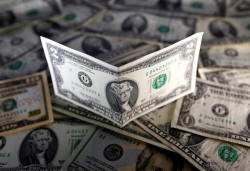|
Trump policy vacuum sucks
dollar lower
 Send a link to a friend
Send a link to a friend
 [January 12, 2017]
By Patrick Graham [January 12, 2017]
By Patrick Graham
LONDON
(Reuters) - The dollar sank to a five-week low below 114 yen on Thursday
and was on course for its worst week since November, hit by a loss of
confidence in the U.S. reflation trade which has dominated markets since
Donald Trump's election.
Speculators had driven the dollar higher on Wednesday in expectation
that Trump's first news conference since his victory on Nov. 8 would
give more detail on new fiscal spending and tax measures to repatriate
U.S. corporate capital held overseas.
Instead, the event was dominated by debate over Russian hacking and
unsubstantiated claims that he had in the past been caught in a
compromising position in Moscow. U.S. Treasury yields fell to their
lowest since November in early deals in Europe on Friday.
"For the moment I would stop short of drawing broader conclusions. I
think he will still implement his policy platform," said Lee Hardman, a
currency economist with Japan's MUFG in London.
"But he has failed to provide a fresh catalyst for the reflation trade.
That has led to the positions on the dollar continuing to correct this
morning."

The greenback fell as low as 113.75 yen <JPY=>, its weakest since Dec.
8, and down 1.2 percent on the day.
The dollar index, which tracks the U.S. currency against a basket of six
major counterparts, fell another 0.8 percent to 100.98. It had risen to
a one-week high on Wednesday.
The euro gained 0.6 percent to $1.0645 after skidding to a 14-year low
of $1.0340 last week.
[to top of second column] |

U.S. dollar notes are seen in this November 7, 2016 picture
illustration. Picture taken November 7. REUTERS/Dado Ruvic/Illustration

While some investors who missed out on the dollar's post-election rally
were still looking to buy on dips, others were seeking to pare their
long dollar positions in case the coming reality of Trump's
administration fails to live up to expectations, market participants
said.
But there has also been a broadly stronger tone to commodities-linked
currencies like the Canadian and New Zealand dollars. The former hit its
highest since October in early trade in Europe and the kiwi gained
around 1 percent.
Javier Corominas, head of research at London-based fund Record Currency
Management, said he also saw signs of growing risks to the dollar
against the euro in European economic data.
"One thing is the market is not pricing in the potential upside in
European growth this year," he said.
"The soft data has been positive and we have the impact of a weaker euro
this year. That could have implications for ECB tapering, potentially,
and a back up in the euro interest rate curve, which would potentially
trigger (euro) appreciation."
(Additional reporting by Lisa Twaronite; Editing by Toby Chopra)
[© 2017 Thomson Reuters. All rights
reserved.] Copyright 2017 Reuters. All rights reserved. This material may not be published,
broadcast, rewritten or redistributed.
 |